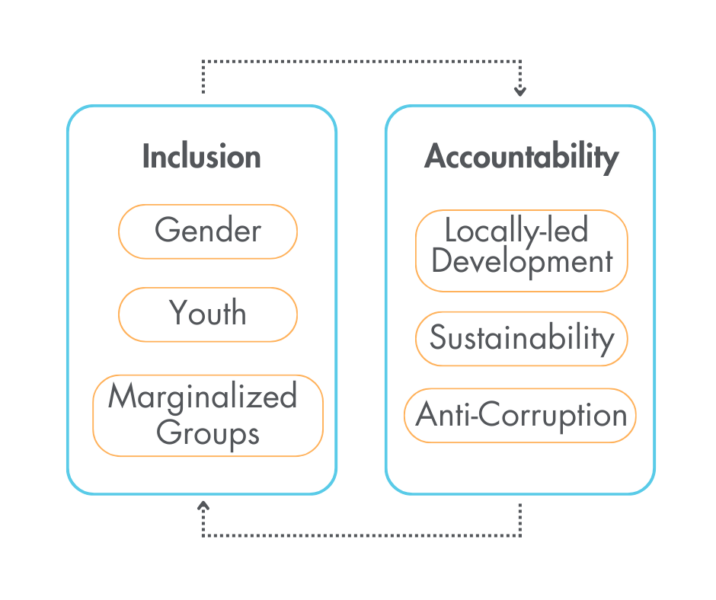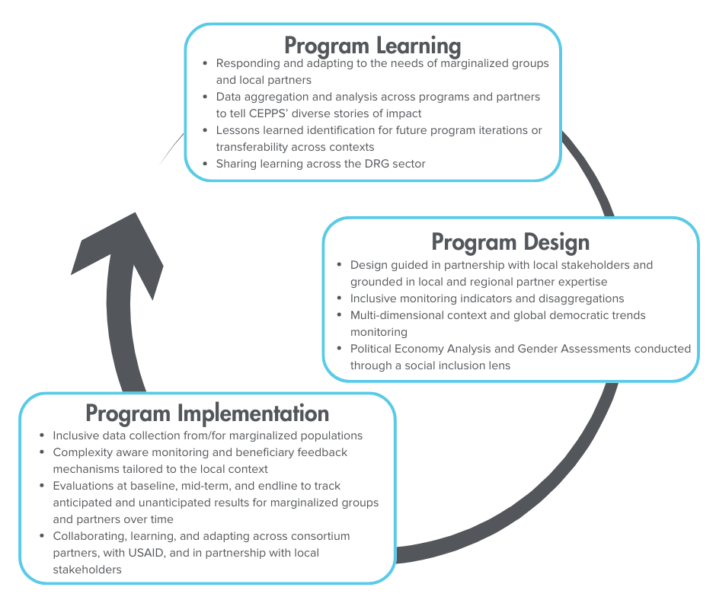CEPPS’s design, monitoring, and evaluation of our programs complements a broader learning and adapting strategy under the Democratic Elections and Political Processes (DEPP) Award. The CEPPS monitoring, evaluation, learning and adapting (MELA) approach is grounded in principles of inclusion and accountability, created to ensure that CEPPS partners have the data and insights necessary to design and implement effective programs that bolster inclusive democratic systems and adequately respond to the needs of diverse members of the societies in which we work. CEPPS MELA approach aligns with DEPP’s cross-cutting priorities, including:

CEPPS’s MELA approach and practices contribute to the evidence base CEPPS is generating through technical leadership research and pilot programs to address the themes and questions in the DEPP Learning Agenda.
The CEPPS MELA approach considers how MELA practices can be designed in formative stages of a program or when adapting a program to changing program environments; how the design is then operationalized through reliable, inclusive, and effective data collection and reporting; and how this data is then used to consider the effectiveness of the program in advancing inclusive accountability. The approach is iterative throughout the program so that challenges and opportunities are consistently addressed through evidence-based approaches promulgated by the MELA approach. CEPPS fosters a holistic, inclusive, and accountable MELA approach in a variety of tangible ways, such as monitoring program performance through indicators and disaggregations specific to marginalized groups as well as gathering feedback from beneficiaries and bringing partners together in reflection sessions throughout program implementation. Importantly, the MELA approach integrates Do No Harm principles, is predicated on “nothing about us without us” principles, and seeks to advance trauma-responsive monitoring, evaluating, and learning practices. Ultimately, the approach and practices employed through CEPPS MELA ensure that our programming is inclusive of and accountable to key program stakeholders.
Promoting Inclusive Accountability through CEPPS’ MELA Approach throughout the Project Cycle:

Data-driven Design
CEPPS partners collaborate to develop programs inclusive of the voices and priorities of women, youth, and historically marginalized groups, including people with disabilities, LGBTQI+ individuals, Indigenous Peoples, and ethnic and religious minorities. In the development of every program, diverse partners come together in data-driven deliberations to evaluate the challenges and opportunities for democratic development in the countries where we work. CEPPS ensures designs are accountable by supporting locally-led activities that emphasize anti-corruption, good governance, and sustainability. Each program is tailored to address current and emerging dynamics drawing upon partners’ wealth of in-country expertise, assessments, databases, public opinion polls, context monitoring systems, and global democratic trends dashboards.
Resources: